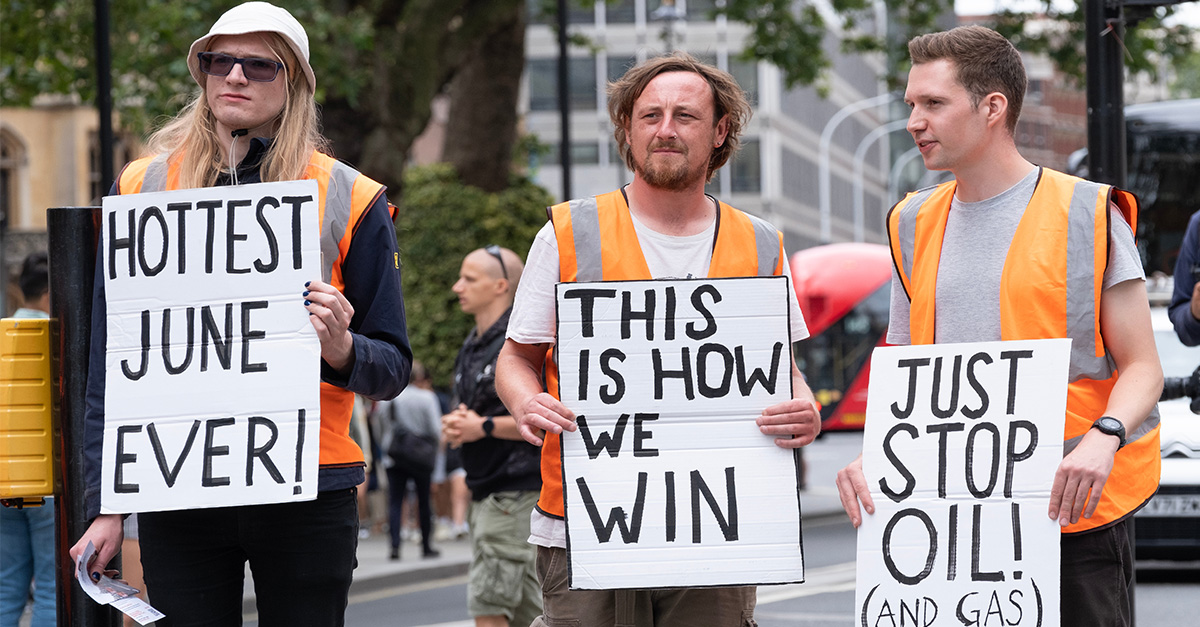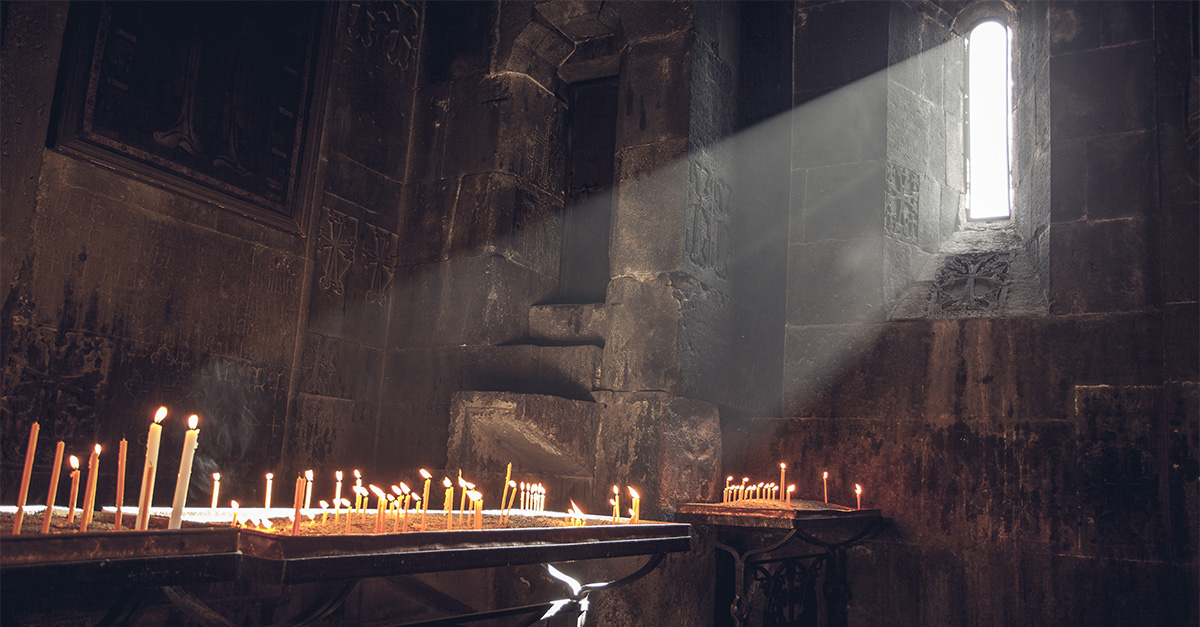


Get a free copy of Parental Rights & Education when you subscribe to our newsletter!

Christians are called to recognize that we are to be good stewards of all that God has given us, including fossil fuels, but we must be cautious about the rising trend of climate alarmism that can mimic elements of false religious worship.
In today’s world, the issue of climate change has become a prominent concern of the global progressive class, sparking passionate debates and calls for action.
In a previous article about this issue I wrote that:
“Over the last 20 years, climate change activists — better, alarmists — have been sounding the alarm over an imminent climate catastrophe. Apparently, it’s so serious that some people are afraid to have children.
But none of it has, nor is likely to, come true (not according to honest scientific assessments). It’s not real. It’s Chicken Little revised and writ large for a brand-new fear-conditioned audience.”
News reports of major acts of vandalism and large-scale economic disruption by climate alarmists bring this topic to the forefront of our national conversation on a regular basis. Yahoo News reported that “Two climate change protesters have been arrested Monday (6 November) after they smashed a protective glass panel covering a famous Diego Velázquez oil painting at London’s National Gallery…Just Stop Oil, which has previously led similar protests targeting famous artworks and public buildings, said Monday’s action was to demand Britain’s government immediately halt all licensing for the exploration, development and production of fossil fuels in the UK.”
While needlessly destroying priceless art is bad enough, even worse are the planned attempts at massive disruption. MSN reports that Just Stop Oil is fundraising for a major event, with activists claiming that:
“In our fourth major campaign, we are on the brink of a massive victory for humanity.
Can you support ordinary people stepping up to extraordinary acts in the face of repression?
The next two months are going to be amazing. There will be epic disruption on a level not seen before.”
How then should Christians think about climate change? In particular, how should we respond to climate alarmism?
As Bible-believing Christians, it is crucial to approach this topic from the perspective of our faith, grounded in the teachings of the Bible. In this biblical worldview entry, we will explore the biblical worldview on climate change, focusing on three key points: 1) God made the world for man, not man for the world; 2) Mankind is called to be good stewards of all that God has given us, including fossil fuels; and 3) how modern-day climate alarmism appears more often like a false religion, reminiscent of Gaia worship.
The Bible teaches us that God created the Earth, and it was His divine plan to establish a world that would serve as a suitable habitat for humanity. In Genesis 1:26-28, it is written:
“Then God said, ‘Let us make man in our image, after our likeness. And let them have dominion over the fish of the sea and over the birds of the heavens and over the livestock and over all the earth and over every creeping thing that creeps on the earth.’ So God created man in his own image, in the image of God he created him; male and female he created them. And God blessed them. And God said to them, ‘Be fruitful and multiply and fill the earth and subdue it, and have dominion over the fish of the sea and over the birds of the heavens and over every living thing that moves on the earth.'”
This passage underscores that the pinnacle of God’s creation is humanity and we were granted dominion over the Earth. It is clear that the world was designed to serve mankind, not the other way around. This biblical perspective emphasize the significance of humans in the grand scheme of creation.
The world is not the pinnacle of creation, mankind is. God made this good world for us to use and steward (more on that in my second point) for the sake of human flourishing.
Humans aren’t a “virus” in the world, we are those who are made in the image of God. This is a fundamental starting point for rightly understanding everything related to “carbon emissions” and climate alarmism.
While we are granted dominion over the earth, this dominion comes with a responsibility. In Genesis 2:15, we are told:
“The Lord God took the man and put him in the garden of Eden to work it and keep it.”
This passage highlights our role as stewards of God’s creation. It implies that we are entrusted with the care and preservation of the earth. As responsible stewards, it is essential that we manage the earth’s resources wisely, including fossil fuels. Fossil fuels have undeniably played a crucial role in advancing human civilization and powering industries, transportation, and much of our modern way of life.
Modern science and technology, which have been developed with the help of fossil fuels, have improved living conditions, provided medical advancements, and increased food production to feed the world’s population. These developments reflect our God-given mandate to be good stewards and to use the Earth’s resources for the benefit of humanity.
In recent years, climate change has been the subject of intense alarmism and rhetoric. Some have rightly noted that this alarmism has taken on the characteristics of a false religion, drawing parallels to Gaia worship. Gaia worship is a form of nature-based spirituality that treats the earth as a living entity deserving of reverence and worship.
You can spot this religious aspect of the climate “cult” in how they refer to scientists who dissent as “heretics.” Business Insider references Freeman Dyson as one of these “heretics,’ explaining that:
“Physicist Freeman Dyson has been a giant in his field for decades. But the British-born, Princeton-based professor has gained notoriety for his ‘heretical’ views on climate change. While he does acknowledge the mechanism by which man-made greenhouse gasses can influence the climate, he claims current models are way too simplistic to capture what’s really going on in the real world.”
One key aspect of the climate alarmist cult religion, of which all Christians must be dissenting “heretics” like Dyson, is that they support population “reduction” measures such as abortion and euthanasia. Remember: the carbon they want to reduce is you — and your children.
It is important to clarify that not all environmental concerns are inherently wrong. Caring for the environment is part of our stewardship responsibility. However, when climate alarmism elevates environmental concerns to the status of a quasi-religious belief system, it can detract from the central message of the Gospel and obscure our biblical worldview.
In Colossians 2:8, the Apostle Paul warns us:
“See to it that no one takes you captive by philosophy and empty deceit, according to human tradition, according to the elemental spirits of the world, and not according to Christ.”
This verse reminds us to be cautious of any ideology that threatens to replace our devotion to God with devotion to worldly concepts. While many proponents of climate change appear genuinely concerned about the environment (and they prioritize it over human life), it is essential to distinguish between responsible stewardship and the veneration of the earth as a deity.
Finally, there is an interesting connection to point out in the climate alarmism/climate religion conversation. It’s mostly young, fearful people and climate activists who are worshipping the earth, but it’s politicians and other power brokers who are using that fear to usher in a totalitarian government and all of the atrocities that will follow (more abortion/euthanasia/depopulation measures, loss of private property rights, censorship, etc.). The people in charge are using the age-old tactic of fear-mongering and manipulation to cement their power through the manipulation of the masses.
As Bible-believing Christians, our perspective on climate change should be grounded in the teachings of the Bible. We are called to recognize that God made the world for man, not man for the world, and that we are to be good stewards of all that God has given us, including fossil fuels. While some environmental concerns are valid, we must be cautious about the rising trend of climate alarmism that can mimic elements of false religious worship and is a Trojan horse for increased government control and decreased individual liberty.
In addressing climate change, we should seek a balanced approach that respects the Earth as a gift from God, acknowledges our responsibility to care for it, and recognizes the potential pitfalls of elevating environmental concerns to the status of a false religion. By maintaining a biblical worldview, we can navigate the climate change debate with wisdom, discernment, and a focus on our God-given mandate to be good stewards of creation.
If you like this article and other content that helps you apply a biblical worldview to today’s politics and culture, consider making a donation here.
Christian conservative news and issues that matter. Curated just for you!
